Cannes Review: The unsteady but miraculous "Annette"
 Tuesday, July 6, 2021 at 10:18PM
Tuesday, July 6, 2021 at 10:18PM 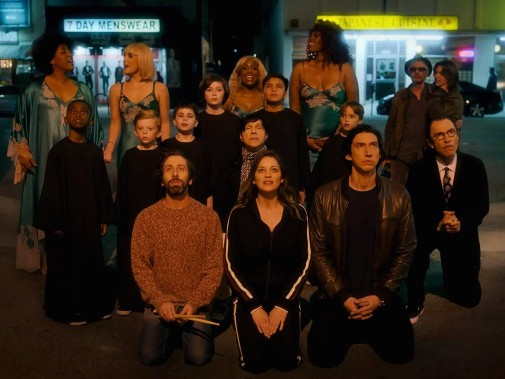
It all starts in the recording studio, as Leos Carax and his daughter - to whom this achingly personal film is dedicated - observe the Sparks working their magic. The reference to supernatural powers when writing on artistic marvel is overused, but it does seem fitting for Annette. Here, performance can invoke a new reality, singing it into existence. That's what the film's team does in this metatextual prologue. As the Sparks exit the recording booth, the camera and the Carax duo follow, with the movie stars joining along for good measure. As they ask "May We Start," they also admonish the audience, heed them, warn them, and set the stage for what's to come. Adam Driver and Marion Cotillard depart in separate vehicles at the end of the song, no longer themselves. The ritual of performance has begun – they're now Henry and Ann…
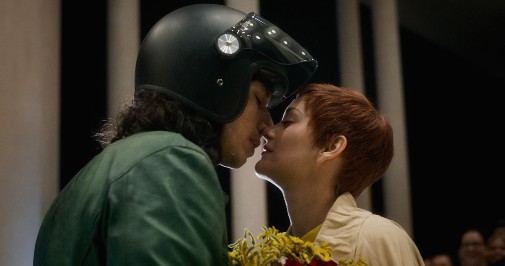
If the A Star is Born story model was stabbed by Bluebeard's old tale of violent men and the women they destroy, it could look a bit like Annette. Though unlike Hollywood's favorite romantic myth about itself, this movie's lovers are already famous when they meet. The start of their romance remains elusively off-camera. But, just as it's happened told before, two stars fail to coexist with the same brightness. As Ann rises, Henry fades, falls. He is an existential comic provocateur whose stand-up combines reflexive heckling and much disgust for the spectator. She's an opera soprano who moves the world with tragedy after tragedy. He kills with laughter. She dies for tears. Or is it the other way around? Sometimes, it isn't easy to tell. In either case, he frustrates while she saves. Over and over, they do their routine. Over and over, these ideas are brought up.
In the same sense that performance, be it comedy, opera, dancing, puppetry, or even conducting, can make new worlds out of nothing, so can words. Whatever that means in Annette, the porous barrier between real and unreal can become immaterial when the two stars are on stage, vomiting their words into the ether. At a certain point, Ann's signing opens a gate that takes us from an abstract theatrical forest to the woods. At another juncture, one of Henry's most excruciating acts devolves into vileness when he jokes about killing his wife. He's not serious. Or is he? Does it matter? The words are out in the world, and they have meaning, power. They contract and constrict fates. Later, a ghostly promise will condemn a baby to be a vessel of vengeance, a victim of beyond the grave parental abuse while her last living parent exploits her.
As you may surmise from such descriptions, Annette isn't an especially jolly film, spitting in the face of those who may envision musicals as a matter of escapism or melodious catharsis. Instead of alleviating ennui, this self-reflective epic wants to look within. In many ways, such strange intentions are a result of internal friction. Yet, while the stench of irony emanates from the narrative, Carax's rendering of the Sparks' script is so sincere it hurts. Born from the idea of a concept album planned initially for live performance, Annette's transition to a big-screen experience isn't without some dolorous surgery. Moments don't flow together, starts and stops giving the sense of a hiccupping film, a newborn gasping for air between shrieks. It's the push-and-pull of artistic creation, as unsteady as it is magnificent.
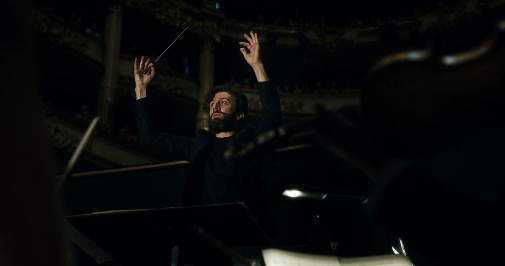
Artifice isn't folded into the movie's fabric as much as laid atop it, an unyielding reminder of the fakery we're being presented. Illusion is the tenet of all art in this director's conception of cinema, and so Annette's tale of amour fou doesn't shy away from the absurdity of pretense. The tragedy isn't less extreme because it's a lie. The emotion, the alienation, the love it seeks to produce aren't delusions, and that's all that matters. Doubling down on single elements also intensifies our awareness that this is a constructed show. Repeated images get different meanings, just as repeated lyrics transform through distinct intonations. Hands loom over, threatening an attack, strangulation. But then, they melt into a caress, hand-holding in pastoral scenery. When the composition returns, there's no caressing to be found. It's bold and brazen, devoid of subtlety, vibrating with the will to shock.
The musical flow is less disruptive, the Sparks weaving a series of distinct genres into a tapestry of incohesive cohesion. Rock and spoken singing give way to some demonic stand-up chorus, an aria, a repetitive love song whose circular wordplay sounds as if the singers are trying to convince themselves that what they're chanting is true. Some moments start uncomfortable and become worse. Others resolve themselves in joy or an ominous portent. "Six Women Have Come Forward" made me squirm in my seat, dreading a cruel parody, but events down in the narrative reposition the dream sequence as a premonition, a righteously right warning. Another factor in this mighty discomfort is how strained the singing often is. Turning away from polished prerecorded vocals, Carax insisted on doing everything live, apart from some operatic and out-of-this-world assists to Ann and Annette. It turns out that the motion from the studio to the streets in the opening was also an illustration of the director's methodology.
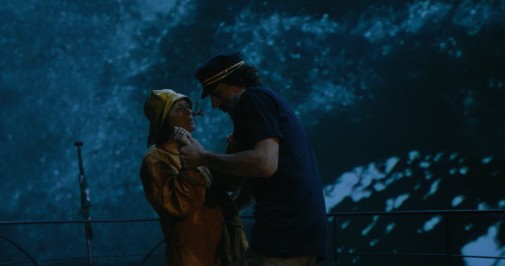
Each actor fares differently in this paradigm, though there aren't many cast members to consider. Focusing on our main couple, Cotillard's Ann has a beautiful voice that shifts from fragile to powerful in the same verse through the aforementioned sonic wizardry. Constantly grasping at red apples, she feels more like a biblical idea than a person, and that ever-shifting sonority suits her well. She's Eve who mistakes the serpent for her Adam. Driver is both less vocally gifted and much more challenged than his French costar. That he excels is impressive, though few people will find his singing melodious. Instead, Henry's oft-discordant numbers, combined with extreme physicality, are notable for how bracing they are. Violent masculinity in the shape of an incompetent jokester isn't an innovative concept, yet musical mercuriality gives it a new form. He's a black hole raging in half-naked glory, devouring everything around him, consuming and killing. It's perchance Adam Driver's greatest performance yet. It's undoubtedly his riskiest.
Casting his eyes to the dark abyss after the picture's most sorrowful beat, he begs (or demands) that we stop looking at him. After so much self-evisceration and justified hatred, we no longer have access to them. From transparency, the palimpsest of performance leaves on a note of opacity, as inscrutable as many will find the entire movie to be. Don't expect another Holy Motors as much as the bastard child of Brady Corbet's Vox Lux and Abel Ferrara's Tommaso, perchance a cousin to Charlie Kaufman's Anomalisa. That may quell expectations or do the exact opposite, which feels appropriate. Annette is a film made for polarization, disagreements, fire, fury, and much passion, whether positive or otherwise. Washed ashore on a lonely island, lost amidst a storming sea of potential detractors, Annette has at least one fan.
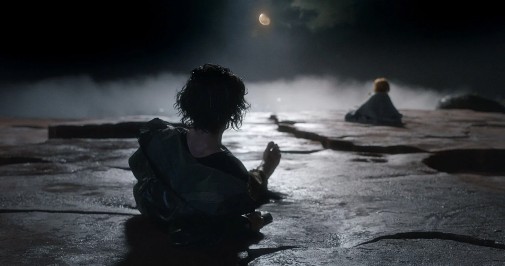
Annette will have a limited US theatrical release on August 6th and begin streaming on Amazon Prime two weeks later.
 Adam Driver,
Adam Driver,  Amazon Prime,
Amazon Prime,  Annette,
Annette,  Cannes,
Cannes,  Leos Carax,
Leos Carax,  Marion Cotillard,
Marion Cotillard,  Sparks,
Sparks,  musicals
musicals 


Reader Comments (4)
I so want to see this. Having recently seen The Sparks Brothers as I came in knowing little about Sparks and coming out knowing even less about them. I want to see this even more.
Loved your take on Annette, Cláudio. I can not wait to catch up with Annette reviews because anyone has something to say about it and...anyone is right, in a certain way?
It's polarizing for sure, but it gives you so much to think (and react) about.
I still do not understand what people see in Adam Driver. He is not a handsome face, he can't sing, he plays self-absorbed, self-important characters and is a bit like that in real life - NPR interview walk-off as an example. Each to their own. Not my cup of tea.
Well, it is not a film for me. I really gave it a shot. I have a lot of admiration for both Adam Driver and Marion Coltillard. They were certainly interesting to watch. Adam is attractive in what we used to call an "ugly handsome" way. This is the 2nd film he's sung in that I've seen, and he's quite good (to my untrained ear). Marion is just fabulous in what seems like every single time. But the plot and themes explored did not ring true to me. I'm glad I watched, though, even though half way through I was basically done.